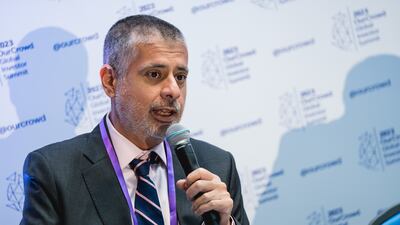On September 15, 2020, the foreign ministers of the UAE and Bahrain joined Israel's prime minister on the lawn of the White House. The trio had shocked the world by signing the Abraham Accords, one of the most significant diplomatic achievements in the history of the modern Middle East.
For its more than 70 years of existence, Israel had known mostly enmity with its Arab neighbours. Only Egypt and Jordan recognised Israel’s existence, and that came as the result of bloody wars.
The Abraham Accords promised something far better: peace built on “mutual understanding and coexistence” – Israel finally had its first Arab friends.
The fifth paragraph of the accords detailed how the signatories planned to build this relationship: “We support science, art, medicine and commerce to inspire humankind, maximise human potential and bring nations closer together.”
Three years on, venture capitalist Sabah Al Binali of OurCrowd – the first Emirati partner at an Israeli firm – sat down with The National to give his assessment of the current state of UAE-Israel commerce.
“I believe the potential of the accords is much bigger than many think,” he says from his office in Abu Dhabi.
But Mr Al Binali is not starry-eyed – it has been a rocky start. Business is still business, and three years on, he thinks there is lots of work and introspection to be done.
“There’s a phrase in venture capital to describe a problem many tech companies face: the valley of death. It’s when a firm sees an opportunity and has developed something, but hasn’t yet got market validation,” he explained.
“They get overexcited, and then things drop suddenly. I believe we find ourselves in such a place.
“There was a big flurry of meetings at the beginning. But meetings aren’t activity. Activity is learning what each side wants and finding commonalities.”
It is not an admission of defeat. Bilateral trade between the UAE and Israel still reached more $2.5 billion in 2022.
But Mr Al Binali says it is crucial to learn from early growing pains if the commercial side of the accords is to grow in the years ahead.
“Many people thought it would take a shorter time to fulfil commercial potential than I ever did,” he said.
partner at Israeli firm OurCrowd
“It is important to remember that the UAE and Israel were markets that had never met. They needed time to get to know each other and figure out how to work together.”
Early optimism caused a rush, and in that rush, not enough commercial players have “rolled up their sleeves and taken time to understand the other side”.
Stereotypes went unchallenged, leading to many companies misunderstanding the moment and quite how big, and also complex, the opportunity really was.
Mr Al Binali believes one of the main stereotypes that still lingers is that “innovation and technology comes from Israel and that capital comes from the UAE”.
“That’s limiting and untrue. The Emirates has innovation in services, freight, hotels and airlines, for example, and Israel has significant capital access from around the world,” he said.
“People talk about high expectations that fell short. I disagree. One part of the expectation fell short because people got overexcited about the time it would take to learn to work with each other.”
Life before venture capital might have helped Mr Al Binali adjust sooner than others. Israel and the Jewish world was not a surprise for him.
“I spent 10 years in the US as an undergraduate at Princeton University where there’s a big Jewish community. I made a lot of friends there. I then went to Columbia University for graduate school, where my supervisor was Israeli,” he said.
When OurCrowd approached him soon after the accords were signed, rather than starting to scramble for deals, the firm opened OurCrowd Arabia, an outpost that Mr Al Binali said was crucial to both sides understanding one another.
“Other enterprises came in never having worked with each other, and with certain preconceived notions,” he added.
“There’s nothing necessarily wrong with that. It’s how start-ups work. You have a preconceived notion, you test it, and it very rarely works the first time. So you adjust.
“On the whole, that adjustment hasn’t been happening, except in our case. I hope others start doing it, particularly as we start showing how the process works.”
In the short to medium term, Mr Al Binali thinks this adjustment phase creates favourable conditions for “a few focused companies” rather than the high number of “very large groups” that rushed in during the early, giddy days right after the accords.
“You can’t rush markets and economies. They’re like huge anchors … But I still think that this is going to pay off in a big way,” he said.
“It goes back to how to find an operating model that works for all the stakeholders.”
Even the successful pioneers of UAE-Israel commerce have not found that model yet. But Mr Al Binali does have a benchmark for success in the years ahead.
“At the 10-year anniversary of the Abraham Accords, I don’t just want to see more Emirati companies going to Israel and more Israeli companies coming to the Emirates,” he said.
“I want to see Emiratis and Israelis working together, building companies and bringing their different but complementary skill sets, networks and visions to build truly sustainable companies.”









































